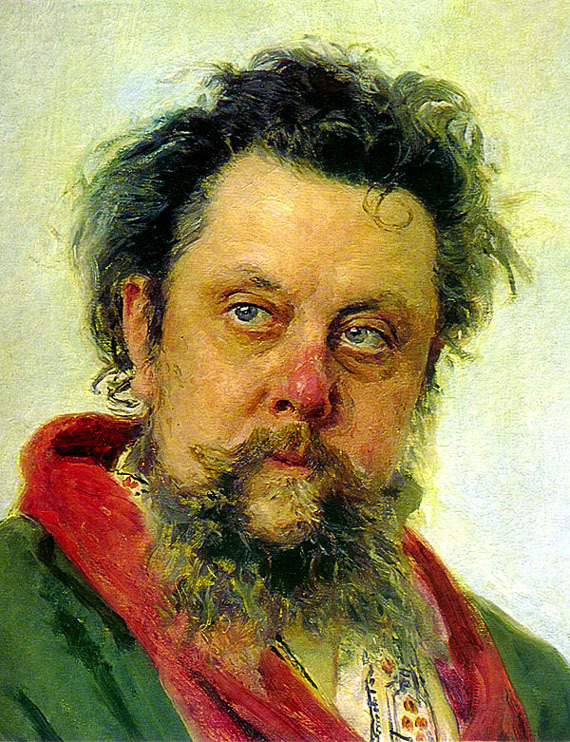On July 19, at Studzinski Recital Hall, the chair of the Bowdoin Music Department, Mary Hunter, will give a lecture titled “Hearing the Life in the Work? Madness, Joy, Oppression and Genius.” The talk is part of the new “Extra” series of the Bowdoin International Music Festival and one that should be marked with a red star by anyone interested in the genesis of classical music.
Hunter’s title led me to a search for pre-eminent composers who were not deranged, and to the conclusion that some of our greatest musical treasures can be credited to American Indians — and I don’t mean the “New World Symphony.”
Derangement, in some form or other, seems almost a necessity for the highest type of creative endeavor. Some artists, like the French poet Rimbaud and the Russian composer Mussorgsky, sought “the progressive derangement of the senses” artificially through drugs and alcohol, but most great composers seem to have come by it naturally through physical or mental disease.
Mussorgsky was apparently self-medicating clinical depression with alcohol. Other noted composers with similar depressive problems were Berlioz, Bruckner, Elgar, Glinka, Handel, Holst, Ives, Mahler, Rachmaninoff, Rossini, Scriabin, Tchaikovsky and Wolf, to list only those famous enough to be known by their last names alone. Our 200th-birthday boy, Robert Schumann, is also on the list, but he belongs in my special subcategory.
Rossini gave up composing for cooking after making his fortune, and our own Edward MacDowell, who never made a fortune, suffered from a form of dementia that prevented him from composing or doing much of anything at all, for the last years of his life.
Schumann, Schubert, Mozart, Beethoven, Paganini, Donizetti, Delius, Smetana and Scott Joplin, to name just a few, suffered from syphilis, the American Indians’ revenge, brought back to Europe by Columbus, and spread widely after 1494. Europeans have tried to take credit for the disease, claiming to have found evidence of it in pre-Columbian cadavers, but its American origin is pretty self-evident.
A record producer once quipped that the trouble with Brahms was “that he didn’t get syphilis,” but one wonders, considering the composer’s youth in the brothels of Hamburg, his avoidance of marriage and his (supposedly) chaste relationship with Clara Schumann. He apparently died of liver cancer.
And then there’s the last of the “three B’s,” old J.S. Bach, who was apparently as healthy as a horse all of his life. He died of a stroke, probably induced by unsuccessful cataract surgery. Still, 20 kids? A thoroughly modern psychologist would probably characterize him as a sex addict.
Bach is an example of the importance of production in the arts. Students should be told that they have to produce a hundred compositions in a limited period of time, invariably do better in terms of both quantity and quality, than given unlimited time to produce a single masterpiece.
I should add a disclaimer that none of the above is meant to convey the impression that a budding genius should go out and try to contract an STD. It may well be that syphilis had nothing to do with the creative output of great composers, just as the febrile excitement of tuberculosis had nothing to do with Chopin’s music. Maybe Schubert would have written more and better without the disease, but I doubt it.
Working under political oppression seems like a better choice. Go find a dictator like Stalin or Mao, who believes in the importance of the classics, and, like Shostakovich, compose subversive works that the KGB won’t understand. It is said of Prokofiev that he returned to the Soviet Union so as to have something to oppose.
Christopher Hyde is a writer and musician who lives in Pownal. He can be reached at: classbeat@netscape.net
Send questions/comments to the editors.



Success. Please wait for the page to reload. If the page does not reload within 5 seconds, please refresh the page.
Enter your email and password to access comments.
Hi, to comment on stories you must . This profile is in addition to your subscription and website login.
Already have a commenting profile? .
Invalid username/password.
Please check your email to confirm and complete your registration.
Only subscribers are eligible to post comments. Please subscribe or login first for digital access. Here’s why.
Use the form below to reset your password. When you've submitted your account email, we will send an email with a reset code.